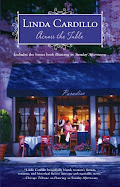
Tuesday, January 5, 2010
Discoveries/Madama Butterfly

Wednesday, November 11, 2009
Inspiration/Die Mauer

Twenty years ago this week, I was driving home from my weekly German class and listening to the news on the radio. Although I’d been living in the country for over a year and had become comfortable in using the language in my daily life, I didn’t always catch the nuances of conversation, especially when I was only hearing a voice coming out of a box instead of face to face with a speaker. And that is why I didn’t trust what I thought I’d heard the newscaster say, although it was a simple declarative sentence of only four words, “Die Mauer ist weg!”
Being in the midst of such a moment taught me to pay attention to its meaning on a personal level to the people around me: the friend who was able to baptize her infant daughter in her husband’s ancestral village in the former East Germany; the new family that moved into our neighborhood from East Berlin who became fast friends, sharing meals, life stories and late-night glasses of vodka; the empty field in our village that was transformed nearly overnight into emergency housing for the thousands of East Germans pouring into the West in search of better jobs, a better life.
The emotional impact of that night on those around me became the seed for my novella “The Hand That Gives the Rose.” The political reverberated into the personal, changing lives, and that is what captured my imagination as a writer.




